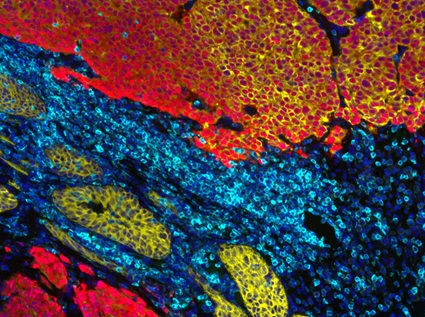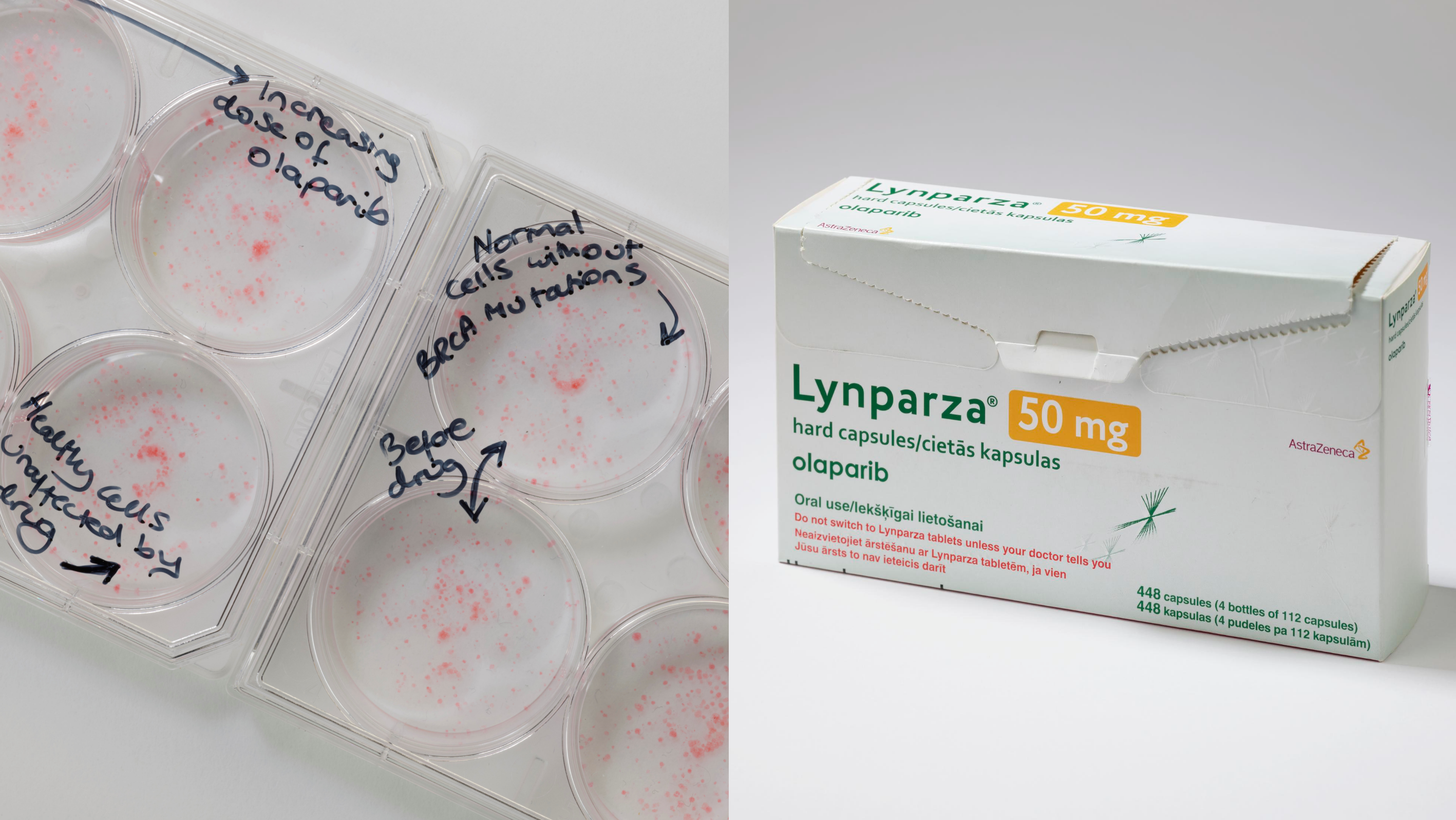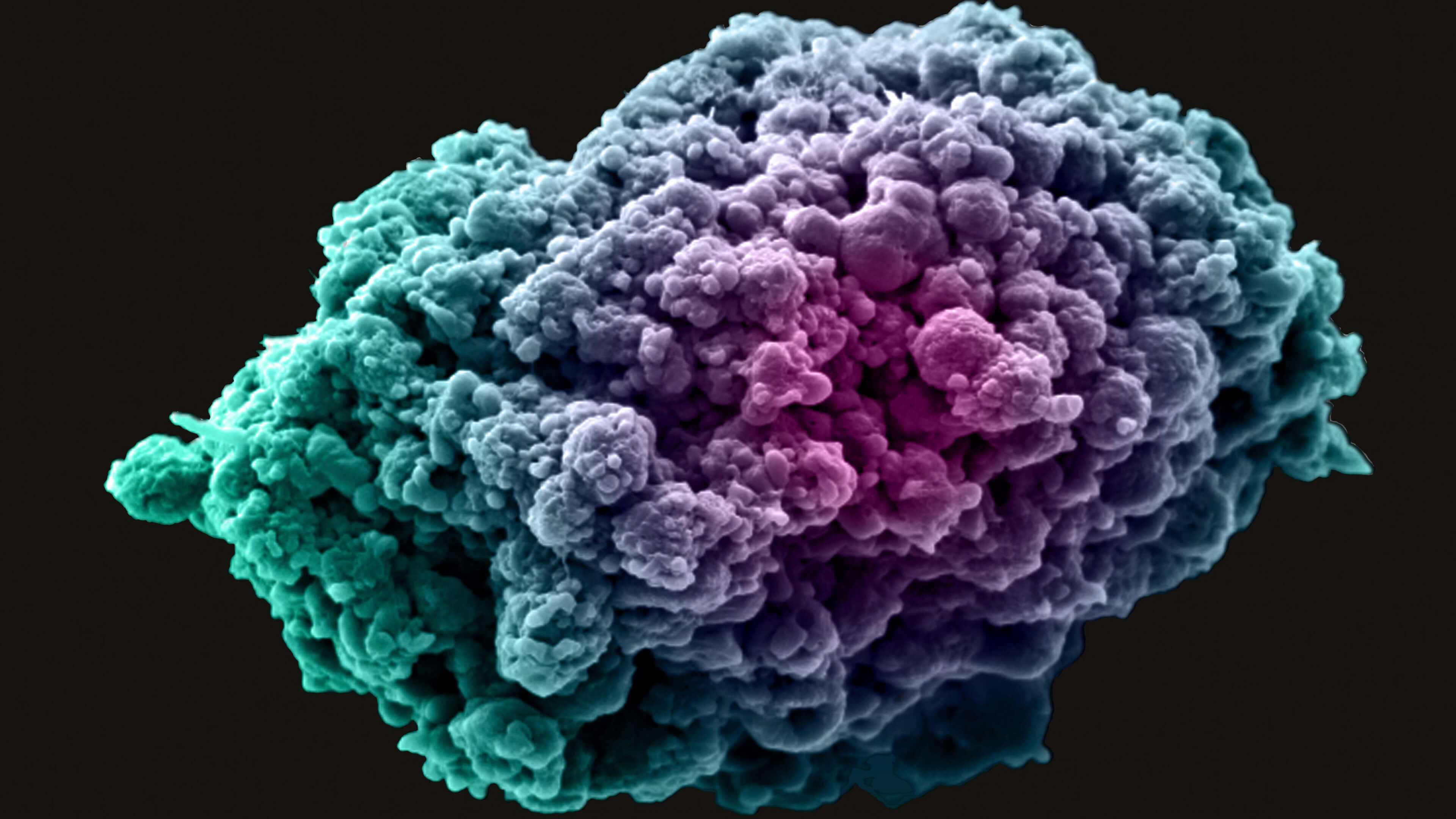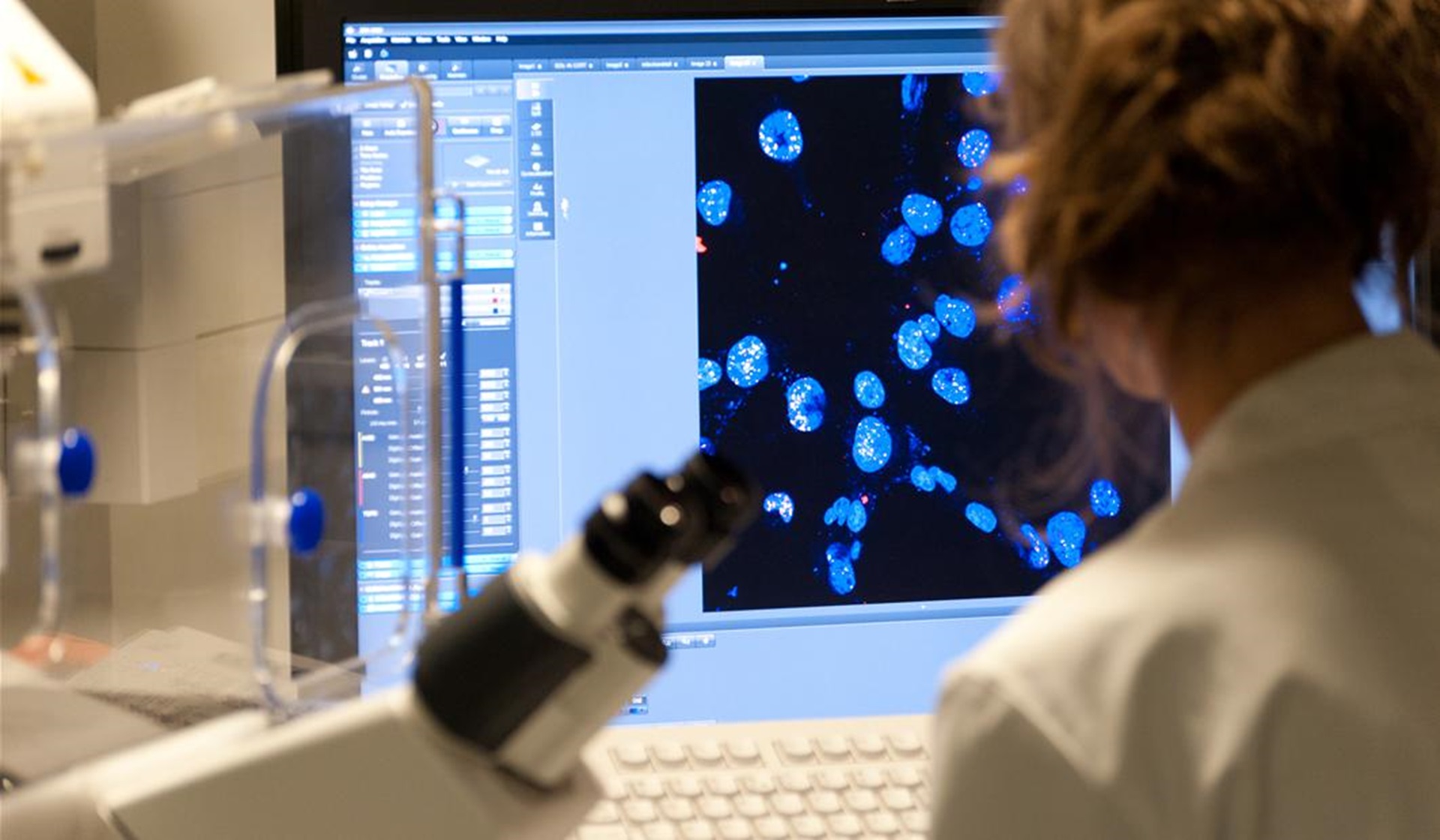Centre for Genome Stability
at the ICR and The Royal Marsden
Centre for Genome Stability (CGS) is a unique multidisciplinary programme bringing together experts from across the ICR and The Royal Marsden who work on DNA-damage response and genome instability research with clinical experts in the treatment of cancer.
How we research at this centre
Our world-leading centre of excellence aims to understand genetic, epigenetic and proteomic changes to genomic stability in the development of cancer in order to develop biomarkers and therapeutic targets for improved cancer treatment. This will allow us to apply multidisciplinary approaches to address important research questions, thus accelerating discoveries into the causes of tumorigenesis and delivering major clinical impacts, both nationally and internationally.
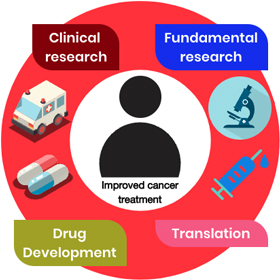
We aim to harness the breadth of expertise in genomic stability at the ICR to develop new and better therapies against cancer to make the most meaningful impact in clinics.
The centre will establish a single-domain antibody screening facility to generate DNA-repair related biomarker detection and intracellular antibody protein perturbation tools.
The Centre's main themes are as follows:
Molecular Mechanisms of Genome Stability Maintenance
Maintenance of genome stability is accomplished throughout the cell cycle by a complex network of proteins referred to as the DNA-damage response (DDR) pathways. Mutations in DDR factors are associated with elevated cancer predisposition. Understanding this will allow us to target tumour-specific DDR dependencies for improved cancer treatments.
Understanding Replication Stress Responses
Cells control DNA replication with the highest possible fidelity in order to prevent catastrophic changes to their genome. Understanding how DNA replication and repair machineries function and how these processes differ in cancer cells could provide new prognostic tools and therapeutic targets.
Integrative Systems Biology of Cancer and Ageing
We will develop tools to interrogate large data sets of genetic, genomic and proteomic information to generate hypotheses for experimental analysis, with the ultimate goal of understanding the changes that occur to the genomes and proteomes of cells as they transition to a cancerous or aged state.
Genome Instability and Cancer Therapeutics
New dependencies within the DDR pathways may represent targetable vulnerabilities in cancer cells, with a major focus on synthetic-lethal interactions and over-reliance on DDR pathways allowing for selective killing of cancer cells.
We want to accelerate the translation and delivery of our research.
As one of the world’s most influential cancer research institutes, we discover more new cancer drugs than any other academic centre in the world. We have made game-changing discoveries that revolutionised the way cancer is studied and treated.
Work with us in the Centre for Genome Stability to develop and commercialise our novel discoveries to defeat cancer. Contact us at [email protected] to work with us.
Internal collaborative opportunities
The Centre supports activities to bring together genome stability expertise across the ICR and The Royal Marsden in order to support and develop new collaborative opportunities.
Centre short talk series
Participate in our series of short talks and hear from colleagues. Next event is expected to take place in October 2024. Further details TBC.
Single-domain Antibody Facility
We have established our Single-domain Antibody Facility with ongoing pilot studies. There will be a call for screening projects.
Requirements to access the facility
Protein/antigen concentration of 500µg – 1mg, with objective of antibody for advice on tag (i.e. denatured/native form of protein). Final validation to be undertaken by research teams due to limited capacity within the facility. If you are interested to find out more, please contact Dr Divya Duscharla at [email protected].
Clinical Research Fellowships
Colleagues across the ICR and The Royal Marsden can apply to appoint Clinical Research Fellows (3-year PhD), addressing a reverse translation topic (bed-to-benchside) and involving clinical and fundamental research labs.
We are now accepting outline project proposals from potential supervisors for the next round of Clinical Research Fellowships for 2025/26 entry.
Please contact [email protected] to express your interest or if you have any questions.
Our researchers at this centre
Fundamental research
Biography
Professor Johann de Bono is Regius Professor of Cancer Research and a Professor in Experimental Cancer Medicine at The Institute of Cancer Research and The Royal Marsden NHS Foundation Trust. He is also the Director of the Drug Development Unit, overseeing the conduct of phase I trials, with a particular interest in innovative trial designs, circulating biomarkers and prostate cancer. Additionally, he leads the Prostate Cancer Targeted Therapy Group and the Cancer Biomarkers group.
Education and training: He graduated from the University of Glasgow medical school in 1989, as a Member of the Royal College of Physicians (MRCP) in 1992. He was awarded a four-year Cancer Research Campaign Clinical Fellowship, which allowed him to pursue a PhD between 1993–97. Following his PhD, he trained in medical oncology and was awarded an MSc (Cancer Sciences) from the University of Glasgow. The Royal College of Physicians and Surgeons of Glasgow then awarded him a travelling scholarship that allowed him to pursue further research on the challenges of clinical trial design at the SWOG statistical headquarters at the Fred Hutchinson Cancer Centre in Seattle, US, in 1999. Between 2000–03, he then pursued further research developing novel anti-cancer drugs at the Institute for Drug Development within the University of Texas Health Science Centre at San Antonio, Texas. He joined the Institute of Cancer Research, London, in 2003.
Honours and awards: Professor de Bono has received many other awards during his career including a Cancer Research Campaign PhD Clinical Research Fellowship, American Society of Clinical Oncology Merit and Young Investigator Awards, a Doris Duke Charitable Foundation Clinician-Scientist Award, and a Royal College of Physicians and Surgeons of Glasgow Travel Award. In 2003, Professor de Bono was elected a fellow of the Royal College of Physicians (London) and of the Royal College of Physicians and Surgeons of Glasgow. In 2009, he was elected as a Member of the Malta Order of Merit. He received the prestigious European Society for Medical Oncology (ESMO) Award in 2012 and was part of the ICR/Royal Marsden team awarded the American Association of Cancer Research (AACR) Team Science Award. He also received an award from the Royal Society of Chemistry for his group’s work in developing abiraterone, as well as the 2018 AACR – Joseph H. Burcheval Memorial Award for Outstanding Achievement in Clinical Cancer Research.
In July 2016 he was named as Regius Professor of Cancer Research – a rare award bestowed by the Sovereign by Royal Warrant to recognise exceptionally high-quality research at an institution, and the first such Professorship devoted to cancer.
Professor de Bono is also a key opinion leader in the development of novel cancer therapies, and co-founded and now runs The Royal Marsden Drug Development Unit, one of the world’s largest such trials units for cancer patients. He has been involved in the development of many novel agents, many of which are now approved drugs.
He is a world leader in prostate cancer research, having changed the treatment of prostate cancer multiple times through trials of the ICR-discovered drug abiraterone, cabazitaxel, enzalutamide and olaparib. He also led on the identification of germline and somatic DNA repair defects in lethal prostate cancer, and co-led studies mapping the genomics of these diseases. His work has changed international guidelines on germline testing in men with advanced prostate cancer and the first molecular stratification for this commonest of male cancers. He has also recently led studies of pembrolizumab, talazoparib, ipatasertib and lutetium-PSMA for men suffering from advanced prostate cancer.
His laboratory has led on the study of liquid biopsies in advanced prostate cancer including circulating tumour cells, whole blood expression profiling, and plasma circulating tumour DNA in metastatic prostate cancer patients. He helped to pioneer the concept of patient molecular stratification in early clinical trials through the Pharmacological Audit Trial.
As well as research, Professor de Bono is involved in training and supervising PhD and MD(Res) research students. He has published more than 500 scientifically peer-reviewed manuscripts in journals including The New England Journal of Medicine, The Lancet, Lancet Oncology, Nature, Nature Cancer Reviews, Journal of Clinical Oncology, Clinical Cancer Research and Cancer Research. He has held editorial roles at multiple peer-reviewed journals and was the Scientific Programme Chair of the ESMO annual meeting in 2014, the Clinical Program Co-Chair of the AACR Annual Meetings in 2015 and 2016, the UK National Cancer Research Institute (NCRI) Annual Meeting 2016 and 2017 Deputy Chair and Chair, the Prostate AACR 2017 meeting Scientific Chair, and the ESMO Targeted Anticancer Therapy (TAT) Scientific Programme Chair. He leads the ICR and The Royal Marsden Experimental Cancer Medicine Centre and the Movember London Prostate Cancer Centre of Excellence.
MB ChB MSc (Cancer Medicine) PhD, Glasgow University.
FMedSci, Academy of Medical Sciences.
MSc Medical Oncology, Beatson Oncology Centre, University of Glasgow.
PhD Molecular Biology, Beatson Institute for Cancer Research UK. Glasgow University.
FRCP, Royal College of Physicians.
Fellow of the Royal Society of Biology, Royal Society of Biology.
FRCP (Glasgow), Royal College of Physicians and Surgeons Glasgow, 2003.
Fellow of the Royal College of Physicians London (FRCP), Royal College of Physicians London, 2004.
Advanced Translational Fellowship in Anti-cancer Drug Development, IDD CTRC, UTHSCSA San Antonio Texas, 2000.
Scholarship "Methods in Clinical Cancer Research" FLIMS, AACR/ASCO/FECS, 1999.
Fellowship at the SWOG HQ Fred Hutchinson Cancer Center Seattle, Royal College of Physicians (Travelling Fellowship), 1999.
Foundation Award for clinical trial design and statistics, Berlex Oncology Foundation, 2000.
ASCO Merit Award, American Society of Clinical Oncology (ASCO), 2001.
ASCO Young Investigator Award, American Society of Clinical Oncology, 2001.
Foundation Award, Berlex Oncology, 2001.
Clinician Scientist Career Development Award, Doris Duke Foundation, 2002.
FMedSci, The Academy of Medical Sciences, 2012.
ESMO Award, The European Society of Medical Oncology, September 2011.
AACR Team Science Award, American Association of Cancer Research, 2012.
RSC Teamwork in Innovation, Royal Society of Chemistry, 2011.
Elected Overall Scientific Program Chair for ESMO, European Society for Medical Oncology, January 2012.
Elected Member, Society for Translational Oncology, 2009.
Editorial BoardsJournal of Clinical Oncology, 2010.
European Journal of Cancer, 2012.
Cancer Discovery (focusing on Research Watch), AACR Scientific Editor, 2011.
Molecular Cancer Therapeutics, 2010.
Clinical Cancer Research, 2010.
The Oncologist, 2010.
Scientific Committee, Member, AACR-NCI-EORTC Elected Member Scientific Committee, 2007.
Special Conferences Committee, Member, American Association for Cancer Research (AACR), 2011-2014.
ESMO National Representative for the United Kingdom, Elected member, European Society for Medical Oncology, 2006-2008.
Prostate Cancer Clinical Studies Group, Elected member, National Cancer Research Institute (NCRI), 2006.
Scientific Committee, Chair for ESMO Madrid 2014, European Society for Medical Oncology (ESMO), 2012.
New Agents Committee, Committee member, Cancer Research UK, 2008.
Clinician-Scientist appointment committee, Committee member, Cancer Research UK, 2010.
Bursaries Committee, Committee member, Cancer Research UK, 2008.
AACR Scientific Program Committee, Committee member, American Association for Cancer Research, 2007.
AACR Special Conferences Committee, Committee member, American Association for Cancer Research, 2011-2014.
ASCO Education Committee, Committee member, American Society of Clinical Oncology, 2012.
European Male Urology Conference (EMUC) Organising Committee, Member, European Male Urology Conference, 2011.
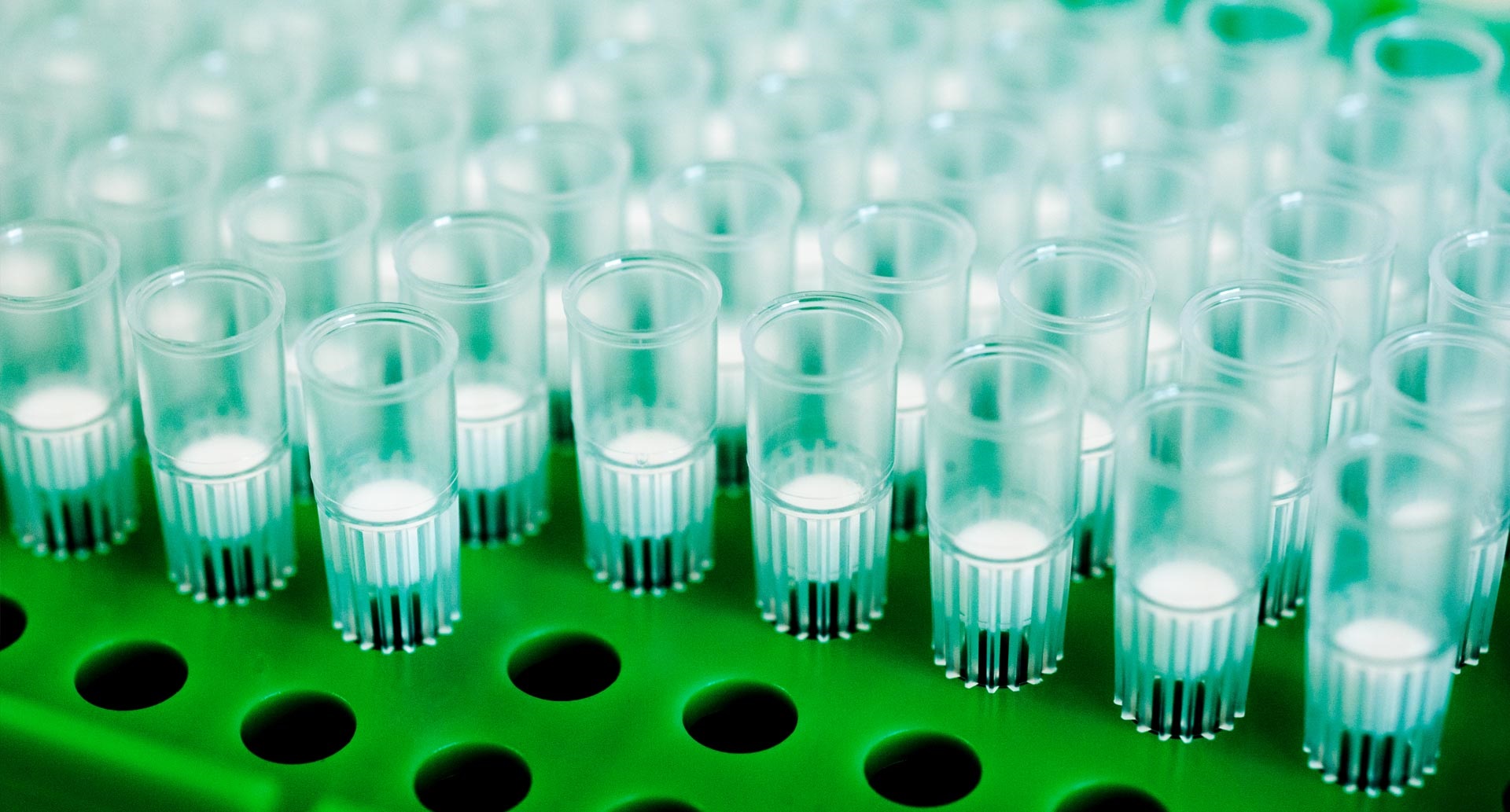
.png?sfvrsn=38d02ad6_1)
